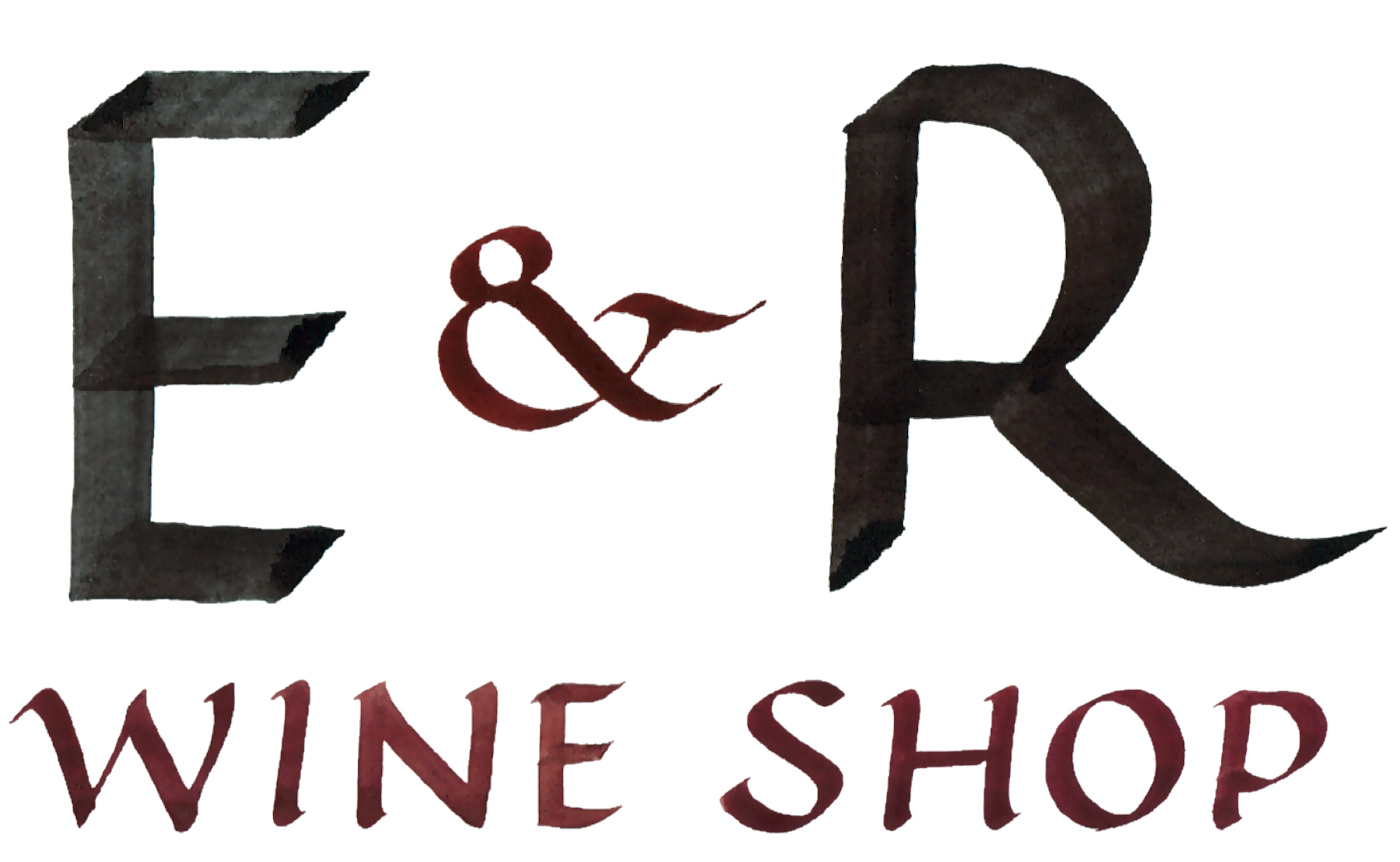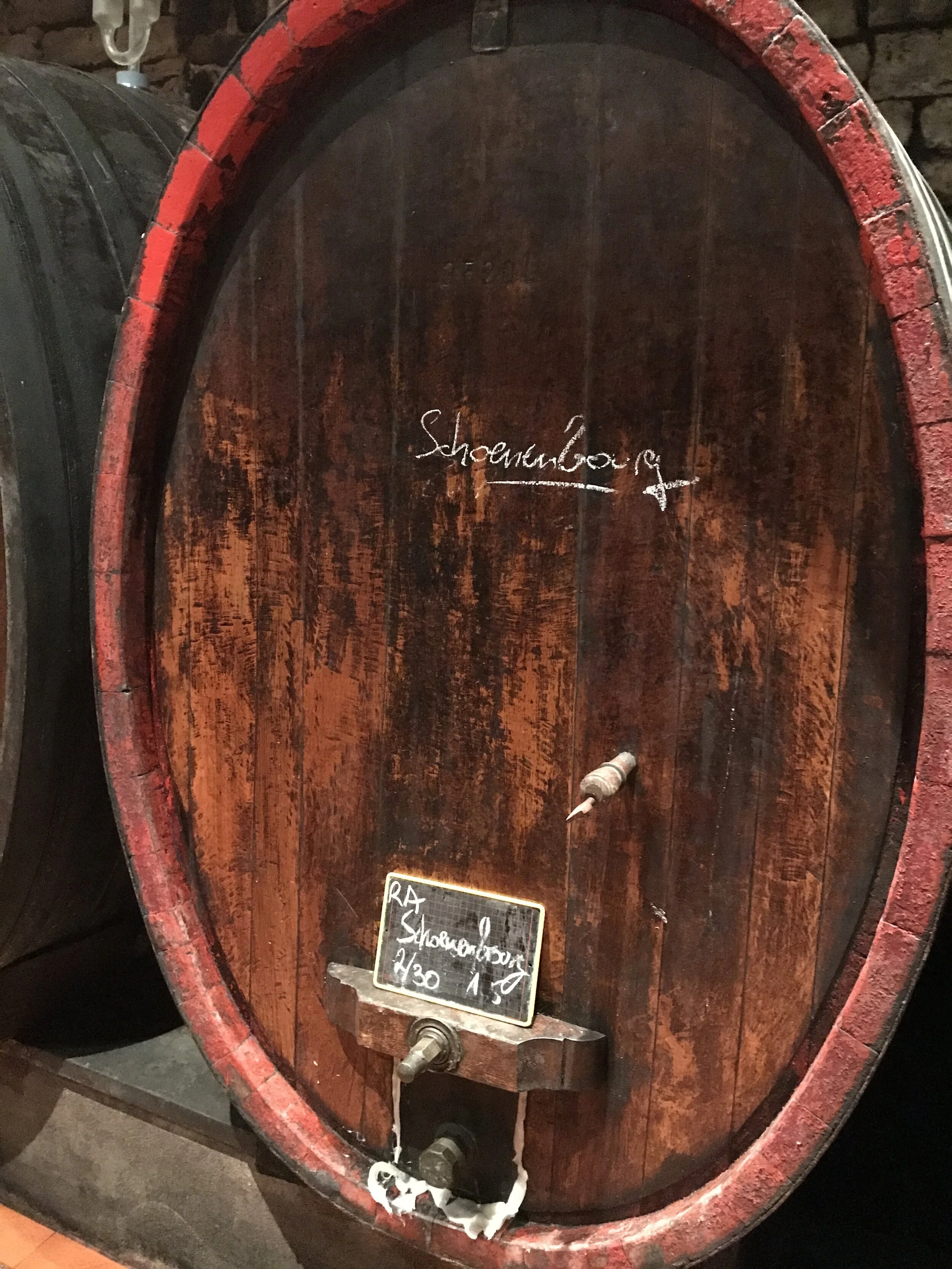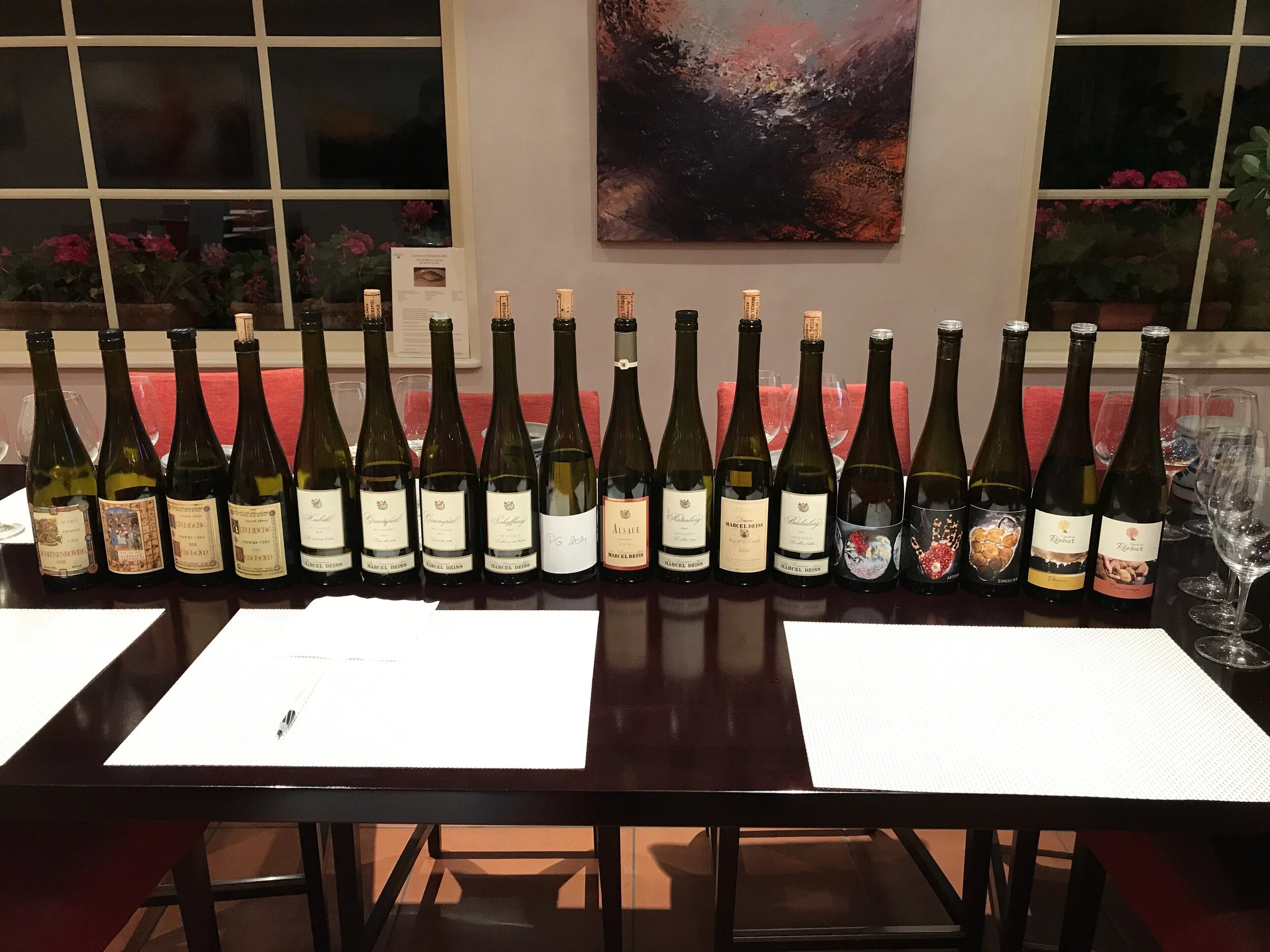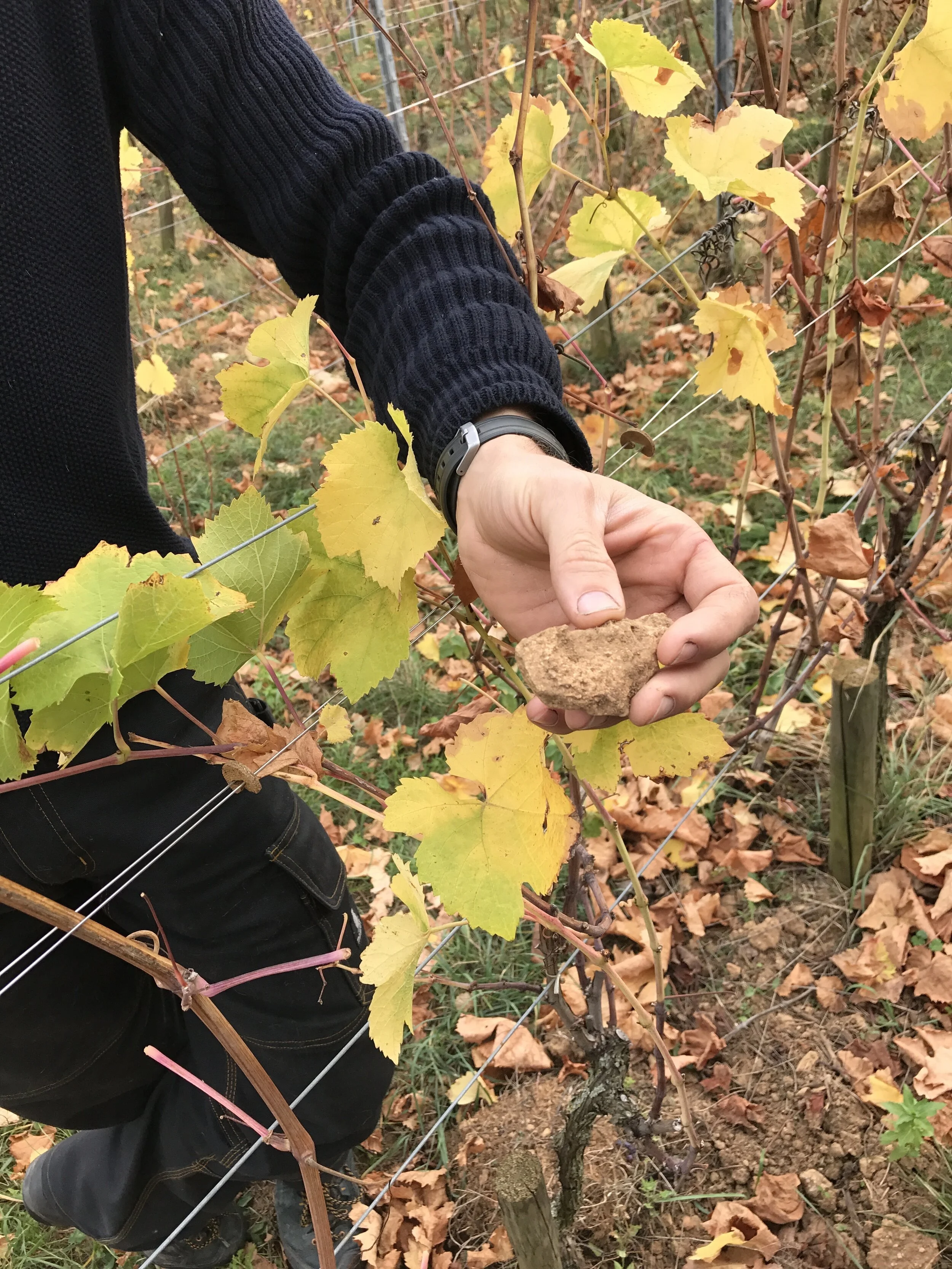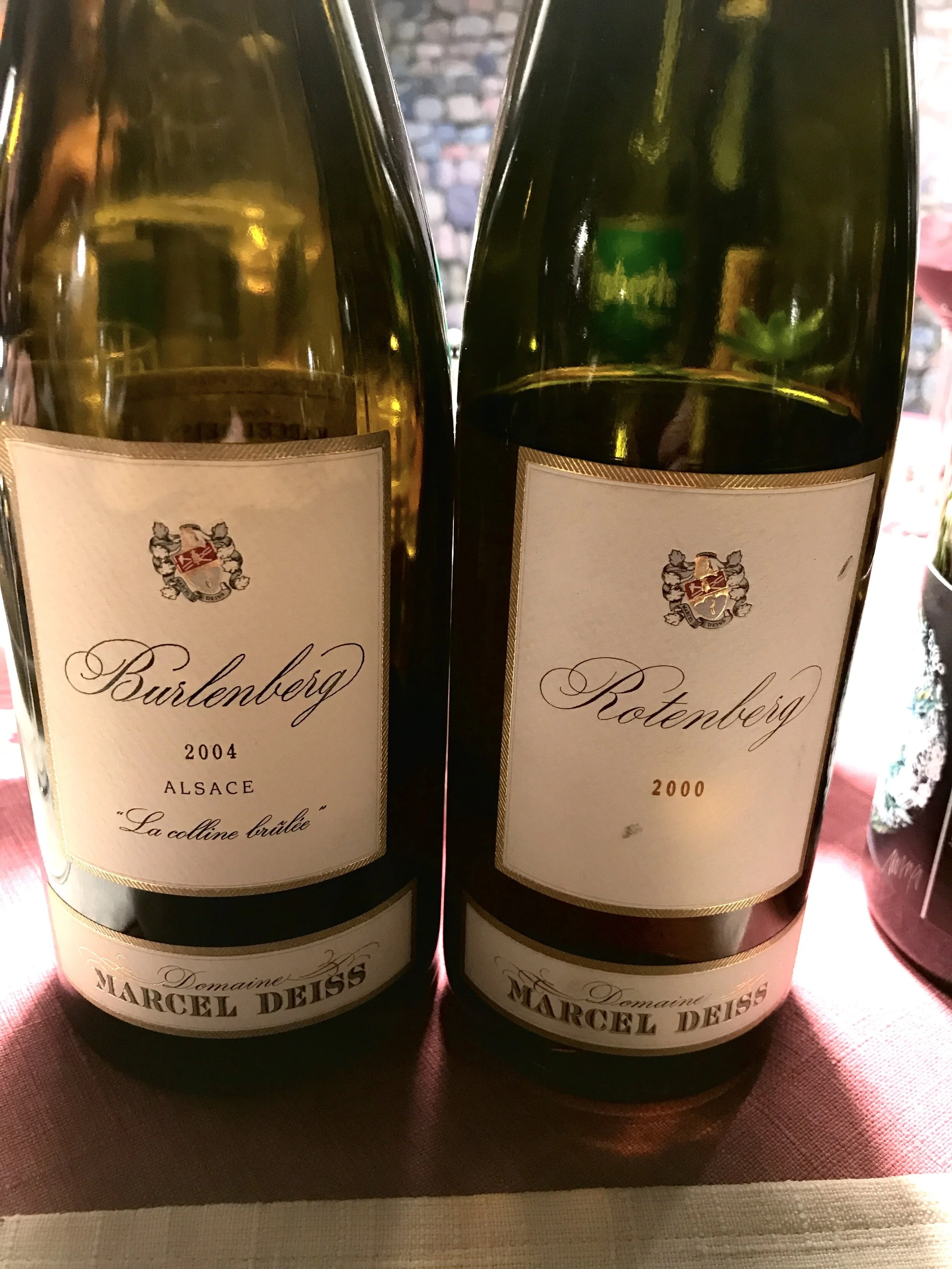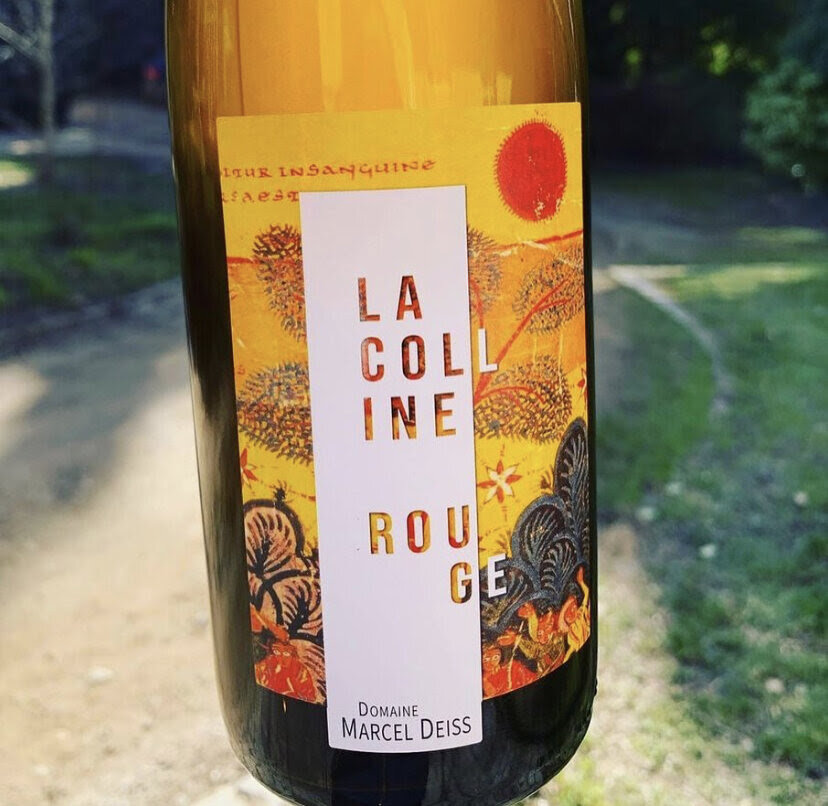Domaine Marcel Deiss - Alsace, France
From one of our visits to the Domaine - the Grand Cru wines.
THE SUPERB WINES OF DOMAINE MARCEL DEISS
Jean-Michel and Mathieu Deiss: 21st Century Masters In Alsace
Domaine Marcel Deiss is one of the world's truly outstanding wineries. Jean-Michel Deiss, joined fully now by son Mathieu, follow a singular, knowledgeable path in making the wines of the Domaine. First and foremost is the shared belief - making great wine starts with a great vineyard. Then only by close, careful and complete work in that vineyard, can one produce the finest grapes to make the finest wines. They practice, when warranted, the lowering of yields by thinning/reducing the grapes on each vine before they mature, which adds character and depth to those that remain. This is an important crucial factor in producing world class wine. France's most prestigious wine guide, the 'Revue Du Vin De France' agrees, singling out the Deiss winery as one of the top wineries in France, along with the likes of J.L. Chave, Raveneau, and Chateau d'Yquem.
Jean-Michel and Mathieu feel strongly the best wines come from special places and MUST show that in their flavors. Our many tastings repeatedly concur that the Deiss wines are remarkable, complex, powerful and exciting wines that are true to the best of Alsace.
Jean-Michel Deiss. (photo courtesy of Jean-Michel and Marie Helene at the Domaine)
Sometime back there was an independent thinker who made great wine in the NE of France. He made these wines in a region that had been "traditional" for ages. When his neighbors learned what he believed in and how he was making his wines, they thought he was crazy. He was considered a wild card, the crazy dog in the basement; it even may have been whispered that he was mad. (Perhaps as mad as they were at him…) They were right, he is mad. He is mad that anyone would dismiss any effort to make the best wine they can, to follow their own ideas about how best to express the character of their land. And this leaves us; we are also mad. Mad about how wonderful his wines are. We consider ourselves blessed to have been able to visit, taste, and learn with Jean-Michel Deiss at his winery in Alsace. His ideas about the individuality of each vineyard being crucial and the concept of blending co-planted varietals from these top sites has caused concern in Alsace. But, as Jean-Michel noted to us "this is how things were done centuries ago, so it is not so radical after all.”
Old barrels for Grand Cru Schoenenbourg - from our last visit to the Domaine.,
It is a beautiful thing to see the expression on the face of a wine taster trying a wine from Marcel Deiss for the first time. It is especially rewarding to listen to the wine drinker coming in to talk about the latest Deiss wine they had at dinner. The wines are liquid revelation even for those familiar with them. Winemaker Jean-Michel Deiss ("dice") raises the hackles of some of his peers in Alsace. When you talk to them, you gauge it in a little roll of their eyes, or shrugged arced shoulders and the metronome tick-tock of an index finger. With his wine-making philosophy, Deiss has become a man of some controversy. He is his second strongest defender; his wines being his first. The point of controversy is simple, but it burrows its way through Alsace Wine Nation like the "Big Dig" dug its way through subterranean Boston and the city's budget.
Tradition (and wine appellation regulation) is that the major wines of Alsace purely reflect the major varietals of this world famous wine region, thus the key grape names have defined the wines. Riesling, Pinot Gris, Gewurztraminer, Pinot Blanc, Muscat; are a few of the grapes that make Alsace famous and are made from 100% of each varietal and bottled as such. (Unlike Bordeaux or Burgundy where the grape names are not on the bottle.)
Alsace is blessed with a lengthy series of hills and inlets of land like the Maine coast that help compose a number of singular vineyards with unique exposures and soils. Most producers with these highly desirable vineyards put the vineyard name and grape name on the bottle. Jean-Michel believes the finest vineyards are so compelling that geology and micro-climate produce an individual voice. Deiss feels "terroir" takes precedence over varietal, and he has co-planted different grapes within the best of these sites. Their combination then, IS the vineyard. Similarly for his incendiary "Burlenburg" red (!), when visiting him at his home and winery we asked him about this "Pinot Noir" and he said with a serious grin "this is not 'Pinot Noir', this is Burlenburg". Deiss responds to the controversy of his blending grapes by pointing out that in the old days of the 12th century grapes were almost always co-planted and blended.
Ending the old arguments, the Appellation Controllee just gave his Altenberg blend Grand Cru status; a remarkable exception for a remarkable wine.
By way of further introduction: these words from the Domaine itself:
"Domaine Marcel DEISS is located in Bergheim, a small village nestling in the heart of the wine region of Alsace, equidistant from the northern and southern boundaries of the region. Current winemaker Jean-Michel Deiss was born into a long-established family of wine growers, living at Bergheim since 1744. Managed today by Jean-Michel and Mathieu Deiss, the domaine consists of 26 hectares (52 acres) of hillside vineyards spread over 9 communes and approximately 20 kilometers. The extreme variation in conditions of production at the domaine have led Jean-Michel Deiss to seek to express in each wine the three factors that make a wine complete: the grape variety, the vintage and the terroir. The greater the wine, the more the gustatory characteristics linked to the soil take the place of the typicity linked to grape variety or vintage. When speaking of terroir, the following have to be taken into consideration: geology, pedology, climate and micro-climate, technical exploitation of the character of the soil, micro-fauna and flora, and the traditional methods and techniques used to produce wines."
A few additional pertinent notes:
The domaine is totally organic, and that is not some new idea, the farming has been totally organic since Jean-Michel began over thirty years ago
Domaine Marcel Deiss was officially certified as biodynamic in 1997
The yields from the vineyards are very, very low
Jean-Michel and Mathieu use only natural, indigenous yeasts
The wines go through long fermentations in mostly large, neutral casks
Mathieu has been adding to the Domaine’s legend in introducing new ideas with wines styles (natural wines, no sulphur additions, amphora usage and other methods in the winery and in the vineyards)
Mathieu, on our website from a recent visit.
We’ve had the pleasure on a number of visits over the last fifteen years to Domaine Marcel Deiss in Bergheim to taste through all of the wines in sometimes epic but always extraordinary tastings with Jean-Michel, with Marie-Hélène Deiss and with Jean-Michel’s remarkably talented son Mathieu. With the Deiss family making wine since the 1700's, after some thirty vintages, Jean-Michel is an absolute master winemaker and all of the wines show his experience and the class of the family vineyards. His son Mathieu has been in charge of the cellar and of course involved from the ground up since he began walking. As one goes through their lineup, think of it more like a trip through New York's Museum of Modern Art where every canvas may transform your ideas of what you thought you knew and what you knew you liked.
Like other Domaines in Alsace, Domaine Deiss offers their wines in categories; in this case there are three; "Fruit Wines," "Terroir Wines Regional and Cru D'Alsace Terroir Wines" and "Grand Cru Wines". Details follow below.
One final remark directly from Jean-Michel about his wines:
The complantation (art of blending grape varietals in one Terroir) is the most original practice of viticulture in Europe. Long before the winemakers knew about the varieties and become scholar ampelographers, the complantation assumes a regular harvest as noted by Olivier de Serres in his book "The Theatre of agriculture and husbandry fields" (1600 ). Now it’s time for us to re-discover the original encépagements of Grands Terroirs in Alsace!
-Jean Michel Deiss
The Domaine divides most of its production into these categories. The lists below are not intended to be complete or authoritative.
THE FRUIT WINES OF DOMAINE MARCEL DEISS
These are wines which speak to the essence of the individual grape and the ground. The Fruit Wines are intended to be enjoyed and consumed over three to five years after release.
DOMAINE MARCEL DEISS RIESLING
DOMAINE MARCEL DEISS PINOT GRIS
DOMAINE MARCEL DEISS GEWURZTRAMINER
THE REGIONAL TERROIR/VILLAGE WINES OF DOMAINE MARCEL DEISS
Like the wines above except from more specific terroir and/or can be blended.
DOMAINE MARCEL DEISS ALSACE COMPLANTATION
DOMAINE MARCEL DEISS ALSACE ROUGE
ZELLENBERG
RIBEAUVILLÉ
RIQUEWIHR
BERCKEM
SAINT HIPPOLYTE
THE CRU D'ALSACE TERROIR WINES OF DOMAINE MARCEL DEISS
From the Domaine regarding the final two wine categories:
Only Terroir expresses its mark here, dominating the other contingencies. It determines the style, the exact personality, the same physiognomy of wine, in a word, its humanity. For the Grands Crus, the indication of grape variety is often superfluous because the influence of Terroir is so strong and sometimes so contradictory to its usual expressions. In fact, planting a single variety or a single clone of the grape variety, prevents the full expression of terroir just like in the image of a person whose poor vocabulary or alphabet prevents him from describing the world or his feelings deep inside. In the tradition of Alsace terroirs wines, the name of the place was the only thing appointed on the bottle, and complantation was an absolute requirement. As elsewhere, from Bordeaux to Côtes du Rhône and then through Burgundy, who used Pinot Noir, Chardonnay, Beurot even Aligoté mixed in the vineyard until the 50s..... at Montrachet! It is for this reason that we decided, for all wines from great terroirs (Grands Crus and future Premiers Crus ...) not to use the indication of grape varieties which are so simplistic and sterile, but to appoint only the spirit of the place, the energy comes from the bottom of the land, like a scream.
BURLENBURG
BURLENBURG HAUTE DENSITÉ
ENGELGARTEN
ROTENBERG
DEISS GRASBERG
BURG
GRASBERG
LANGENBURG
SCHOFFWEG
GRUENSPIEL
GRUENSPIEL
HUEBUHL
THE GRAND CRU WINES OF DOMAINE MARCEL DEISS
ALTENBERG DE BERGHEIM GRAND CRU
SCHOENENBOURG DE BERGHEIM GRAND CRU
MAMBOURG GRAND CRU
When in stock, wines from this producer appear below. Click on each wine for more detail.
